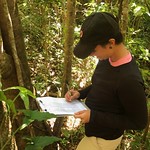
More photos of this internship may be found here.
Join the efforts of this public service non-profit to empower a community to take proactive steps towards a more sustainable future! Here, the relationships between community, environment, and tourism, are viewed from a holistic perspective. Programming centers around topics of public health, permaculture, water quality, ecology, and reforestation, all with the backdrop of sustainable ecotourism.
Internship Start Dates:
Duration of Internship:
The mission of the Monteverde Institute is to promote social, ecological and economic sustainability by integrating community initiatives with education, research and conservation.
Costa Rica, and specifically the Monteverde area, has long been a world leader in ecotourism and biodiversity conservation, and is also at the forefront of efforts related to climate change. Interns with the Monteverde Institute work with local experts involved in a variety of community and environmentally based initiatives that investigate or contribute to solutions to local issues. Students receive background information and the skill sets necessary to accomplish their tasks. Additionally, throughout the internship, the institute provides supervision and expertise to ensure that the intern has the most authentic and beneficial experience possible.
Students would be able to share their results with the community. All internships end with accountability to, and feedback from, the community. All completed work is documented and cataloged in our digital, publicly accessible database for use by future generations. These learning internships help the MVI promote its mission to promote social, ecological and economic sustainability by integrating community initiatives with education, research and conservation.
Interns will identify which of the following broad categories is most of interest to them, and the host organization will then match the intern with specific projects.
Environment and Conservation: Research is supported by, and informs, the host organization’s academic programs and community initiatives. The objective of this internship is to convert raw data into results usable for publication, informing conservation priorities, educating diverse local, national, and international audiences, and laying the groundwork for further research and conservation. This internship can contribute to research in areas such as neotropical migratory bird conservation, tropical habitat restoration, comparative forest integrity, bat distributions, water quality, and meteorological monitoring. Under the guidance of a principal investigator or researcher, interns may prepare and analyze scientific data, interpret results, and prepare the information for distribution to a wider audience (possibly including publication).
Geographic Information Systems (GIS): Map viewer development is a widely applicable and fast-evolving area of Geographic Information Systems (GIS), as evidenced by the number of applications for the general public to display and visualize different types of data. Illustrative examples of GIS projects with this organization may include: making geographic information for vulnerable species easily accessible to the general public through a GIS viewer; developing an interactive map of local, regional, and national producers for the Monteverde zone; and developing a publicly accessible navigable interactive map for the host organizations website.
Sustainability and Resilience: This work will support the design of resilient and regenerative communities and community-driven organizations. Illustrative examples of projects include: assessing impacts of local home gardens in the Monteverde zone on economy and food security, permaculture design, and assessing the impacts of COVID-19 on the community of Monteverde, which is highly dependent on tourism.
The program fee is based on the in the total number of work hours and academic credits. During the application review phase, your Program Coordinator will provide you with an estimated program budget, based on your specific circumstances and internship program. See examples of estimated program fees below.
This internship program ranges from about 120-240 hours over a 6-12 week period.
Quarter Schools
1 undergrad academic credit = 30 total work hours
Semester Schools
1 undergrad academic credit = 45 total work hours
Host Company Fees
NOTES:
* While estimated pricing for 270 work hours is provided, prospective interns should plan on a maximum of 250 hours.
Fall: April 15
Winter: September 15
Spring: November 15
Summer:
- See Qualifications/Requirements section